

A-Z Artist Index Compilations Record Labels Media
Help Us! Contact Us Resources Timeline


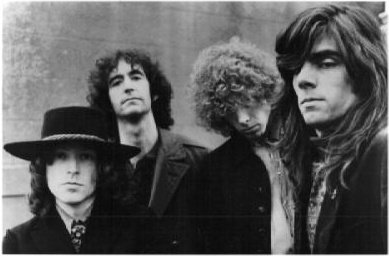
Bio:
An under-rated neo-psych band. Claiming the Steppes as Irish may seem like claiming
Van Halen are Dutch, but the Fallon brothers are Irish born, with family in Tourmakeady in Mayo.
They were raised in the USA. Gilman
and Bailey are American. The pre-Steppes Blue Macs consisted of the Fallon brothers
plus Eddie Gryzb on drums. Erik Denning was drummer during 1987-88 before Bailey returned.
The Blue Macs EP is impossible to find (it took me years to find a copy and then along came two
together, one of which is signed).
The rest of the records show steady progress, culminating in Enquire Within and Harps and Hammers
which are outstanding, but all are thoroughly recommended. The only downside is the consistently
bad cover artwork, a common problem with Voxx releases, and some terrible punning titles.
The following biography was deleted from Delerium's site when the CDs went out of print.
It presents a very good overview of the band and so I'm reproducing it here with author
Richard Allen's permission:
|
It's strange how fashions change. One day thumping sample laden techno beats hold the centre stage, banishing all other popular musical forms to the trend museum, whilst the next, The Beatles, The Stones, The Byrds, The Kinks and The Small Faces are reinstated in the temple and worshipped by the gurus of style. '60's and '70's throw backs, Oasis, Cast, Kula Shaker, Supergrass and the Black Crowes are phenomena which, back in the late '80's, would have received approximately zero press space, as the inkies and glossies devoted reams to discussions about "E" and numerous rave aggregations, long since cast into the filing cabinets of pop history. It was during this period that a band called The Steppes took root, reached the light and bloomed, unnoticed except by those with an ear for good music, rather than an eye for a successful marketing campaign. The Steppes adopted the stance of a rock band in the classical sense. With influences from the '60's and '70's, they brought together pop, rock, folk and rich psychedelia to form a unique and bewitching blend, that captured the band's Irish-American flavour whilst infusing it with an essence of late 19th century poetic whimsy. They are a band which had to make do with low recording budgets and cult record labels but, despite the lacking resources, the strength of their song writing and determination to persist has, almost certainly, burnt a visible mark into the tough hide of rock's ever expanding history. Of Irish descent, but with a youth cradled both in the USA and the green wilds of rural Ireland, the Fallon Brothers John (vocals, guitar) and David (vocals, bass and keyboards) shared, from an early age, a fascination with rhythm and blues and the music of The Beatles, The Byrds, Hendrix, The Rolling Stones and Led Zeppelin. They also had a common interest in the fantastical writings of Robert E. Howard, Lord Dunsany, Michael Moorcock and in the musings of various late 19th/early 20th century writers, poets and philosophers - such as Herman Hesse, William Wordsworth and Oscar Wilde. This exotic mixture of musical and intellectual influences, when combined with psychedelics, would later create the magical and timeless fusion of American acid rock, pop and electric Celtic folk that became The Steppes trade mark. In 1982 John and David, whilst in LA, teamed up with Eddie Gryzb on drums and recorded under the name The Blue Macs. This short lived ensemble recorded a bold, if somewhat rough at the edges, five song 7" EP in late 1982. The record was self produced and was released on the brothers' own Blue Mac Record label, as a limited edition of 200 copies (two tracks from this EP, In Touch and Almost 21, are included on [The Rarities] CD). Most copies of the record were sent to record labels and the music press. In March of 1983, Melody Maker reviewed the disc comparing the brothers "real songs" to the work of Paul Weller, Bob Dylan, John Lennon and the Undertones. Encouraged by this response, John and David returned from a short stay in Dublin to the USA in 1983 and began looking for like minded musicians to record more material. In May of 1983, David and John recorded a set of acoustic demos in a Hollywood studio, which were credited, on the original session tape, to The Steppes Of Russia, (songs included on this CD from this session are: I Think I'll Go, No Names Yet For Henry, People People, Kathy Maguire, Third Love Song and Nothing Really Nothing). Some of these songs later appeared as full electric versions, on the first Steppes release. In June of 1983, John and David joined up with American guitarist Tim Gilman - who's searing West Coast styled guitar solos would give a distinctive edge to the band's sound - and drummer Dante, to form the first line up of The Steppes. After being offered a deal by LA based Mystic records, the band began recording material for their first record. Two recording sessions, almost one year apart, resulted in the mini album - titled simply The Steppes - with side one containing the earliest material. The Mystic EP, as it became known, was a strong record, showcasing gutsy Irish-American Rock and Pop that drew on '60's and '70's influences without sounding dated. Tracks such as the rocking Kathy Maguire and side two's more psychedelic No Names Yet For Henry merely hinted at the band's future sound. The Mystic EP achieved a good deal of college air play all over the USA and made its way via import shops into Europe, generating interest there as well. In the meantime The Steppes made a low budget ($60!) video for Kathy Maguire, which was aired regularly on KWHY TV in Los Angeles, and began touring the LA college circuit. Soon the band was drawn in to the periphery of the much hyped "Paisley Underground" scene and gigged with The Long Ryders, Green On Red, The Rain Parade, The Dream Syndicate, and bands from the East Coast such as Plan 9. Unlike many of their "paisley" contemporaries The Steppes became interested in the more practical aspects of psychedelics. The result of experimentation with their minds and music was a number of demos, recorded in 1985 on a four track recording machine, with new drummer Jim Bailey. The band's hair sprouted in unison with their imagination and the new demos laid the foundations for Drop Of The Creature, The Steppes first album for Greg Shaw's LA based garage/psych Voxx label. Drop Of The Creature was recorded in 1986 and was released in 1987. Almost immediately, the album catapulted The Steppes on to the international stage. Featuring a front cover photo of the band dressed as Edwardian dandies with a purple, tie-dyed back drop and a shot of a ruined castle on the reverse, it was an album that oozed atmosphere and style. Recorded on a low budget, basically live, but with some guitar and vocal overdubs, its diversity allows repeat listenings without tiring and is proof that big budgets do not necessarily produce good music. The opening cut, A Play On Wordsworth, is a frantic and inspired fusion of West Coast acid guitar exploration and poetic vision. Its afterburn is cooled by the wistful acoustic charm of Somebody Waits. Holding Up Well can only really be described as Country Joe and the Fish meets Fairport Convention, as liquid guitar licks interplay with keyboard runs, soaring vocals and Jim Bailey's solidly complex drumming. Make Us Bleed is similarly exhilarating as Tim Gilman lets fly with the most achingly beautiful riff in the mid section of the song. In contrast, See You Around is class psychedelic guitar pop and when the LP gets weird, it does so with grace, as during the bizarre Black Forest Friday - a piece of music that opens out like an acid warped musical box - and Bigger Than Life, which is soaked in backward fuzz guitar. John's and Dave's distinctive vocal harmonies are constantly magnetic throughout, intertwining around lyrics that combine Romantic Mysticism, acid visions and more down to earth boy meets girl imagery. A handful of songs, however, did not make it on to the album and they are included on this CD in their demo form. Trilogy Of One which partly surfaced on the Stewdio album, is a wonderful piece of Irish strangeness, whilst Mary Mary is an inspired slice of guitar driven, rocking pop harmony that could only be written by The Steppes. All You Wanted (which was released in 1988 on a free 7" with Italian Magazine Lost Trails) is a heartfelt, psychedelic love plea whilst the epic History Hates No Man (previously only available in its full version on a noisy 1987 flexi disc given away with issue 4 of Freakbeat Magazine) demonstrates The Steppes unique ability to fuse Anglo-Celtic melodies with '60's acid mayhem. What these demos lack in sound quality they more than make up for in sheer originality and presence. Drop Of The Creature received rave reviews in the USA, The UK, Germany, France, Greece, Italy and Spain and broadened the band's audience many fold. By the end of 1987 The Steppes were split by the Atlantic ocean, with John and Dave in Tourmakeady, Ireland and Tim and new drummer, Erik Denning in California, USA. The second album for Voxx, Stewdio, had been completed during 1987 and was a more complex and ambitious work than Drop Of The Creature, employing a great deal of stereo panning along with horn, string, choir, and backward effects. Stewdio displays a diverse selection of songs and, despite the ill advised cover design and bad joke album title, holds together well. The One Thing is a pop piece in a similar '60's beat mould to See You Around on Drop Of The Creature. Living So Dead (get it?) hints at the heavier direction the band would later take and features some killer acid, fuzz guitar whilst Whole World On Your Shoulder and A Prayer For You are choice Steppes' guitar, vocal and keyboard acid pop. The long Make Peace With Your Darkness features a beautiful Quicksilver Messenger Service like guitar break, whilst the ballad We Make Dreams Come True ambitiously adds orchestral effects and female vocals (Dave's wife Deb), creating an atmosphere that can only be described as a Celtic, Sergeant Pepper like opus. Stewdio, although not as critically acclaimed as Drop Of The Creature, did make a big enough impression, when it was released in early 1988, for The Steppes to plan a tour of Europe in September of the same year. Drummer Erik Denning had dropped out of the band (later re-emerging as drummer with the band Head, who released one album on Voxx) so, with Jim Bailey back on board, The Steppes arrived in London. The visit followed a badly packaged and promoted compilation of material from Drop Of The Creature and Stewdio, entitled Tourists From Timenotyet which came out on the UK based Bam Caruso label. A warm up gig at The Boston Arms in London, on the 29th of September 1988, was the first European date and went ahead despite the lack of attention paid by the UK music press. The gig was followed by a month of rehearsals which included jams with UK bands The Chemistry Set and fellow Voxx signings The Hangman's Beautiful Daughters (John would later marry the lead guitar player, Sandy). It should be noted, perhaps, that The Hangman's Beautiful Daughters were part of the proto-Camden scene, that would eventually give birth to '60's influenced sounds brought to fruition by Creation Records and the likes of Primal Scream. The Hangmen not only included Phil King, who later became the bass player in Lush, but also had links with The House Of Love, TV Personalities and Alan McGee, founder of Creation Records. Had The Steppes based themselves in the UK longer, and immersed themselves in the developing undercurrent, history might have taken a different course. Unfortunately, after a frantic period of touring and recording, distance and expense would soon become a major handicap to the band's career... In October of 1988, The Steppes began their tour of Belgium, Germany, and Greece. The tour was a great success, particularly in Greece, where Drop Of The Creature and Stewdio had been released on LP on the Hitch Hyke label, resulting in audiences of over 1,000 per gig. By November the band was back in the UK and, after a gig at The White Horse in West Hampstead, they began work on their next album Enquire Within. Enquire Within was recorded at Goldust Studios in Bromley and was engineered by Mark Dawson, who had been recommended by Nick Saloman of The Bevis Frond. Over a four week period the band laid down a selection of recordings that would give the band's recorded work the kind of production for which they had long hoped. This album was certainly a turning point in The Steppes sound and, when it was released in 1989, The Steppes started to get major press. The fledgling Q magazine described the album as "a strange, but rather fascinating brew" whilst Italy's Rockerilla compared the album to Hendrix meets Nick Drake! In truth Enquire Within was surely The Steppes attempt to finally satisfy their love for '60's music and bring it into the '90's. Master James which was slated for a UK 12" single that was never released, is a hard edged number that hints at Beatleseque vocal harmonies without being derivative. The love song In Your Prime hangs piano on a waltzing melody line, while the understated passion of You Don't Know How Late is reinforced by brilliantly subdued, electric guitar bursts. During Who Am I To Say Tim Gilman pours some of his most fiery guitar work into a crisp, Hendrix influenced, blues rock mould while The Brightest Lights is pure Steppes - magnificent lyrical, Irish rock blended with acid guitar ragas, mysterious and lethal. The Beatles like Time Goes By, a demo version of which is included on this CD, is the kind of song that has made Oasis famous while Sailing The Silver Cloud rocks out with Celtic abandon. Songs not included on the album were John's Now You Know and Tim's Man On The Moon. The demos of both appear on this compilation. Enquire Within was released on CD in Germany by the Music Maniac label with bonus tracks from the Mystic EP and a truncated History Hates No Man. Despite critical success Enquire Within was not helped by the cheesy, computer generated packaging and lack of effective promotion. The album's music certainly made waves and the band's international press kit grew ever fatter, but the media profile was not significant enough for The Steppes to break through to a wider audience and the distribution and promotion remained underground. Added to this lack of exposure was the fact that House Music was at its peak and Rock 'n' Roll had been demonised as a thing of the past. It could not have been a worse time to try and promote a rock band influenced by '60's and '70's music..... It wasn't until November 1989 that The Steppes returned to Europe, arriving in London to commence another European tour. John had been in San Francisco with Jim (where they recorded Summers End In San Francisco for Delerium Records' debut release, the Psychedelic Psauna compilation) whilst Tim had been in LA and Dave in Ireland with his family. Being so far apart meant that the cost of bringing the band together was starting to mount up rapidly and this would, ultimately, be one of the hurdles that would stunt the band's development. The tour started in Cologne, in Germany, and went into Italy, Greece and Belgium. On the band's return to the UK, they set up residence in London, at a house in Forest Hill, and played two killer gigs in London. The first was at the Falcon, in Camden, on the 5th of December 1989 while the second took place as part of Freakbeat Magazine's "Freakbeat Freakout", which also featured The Bevis Frond and The Chemistry Set, and sold out the 500 capacity Greyhound in Fulham on the 29th of December. With a favourable live review in Melody Maker, The Steppes began recording their next album, Harps and Hammers with high hopes for the future. By the end of January 1990 the album was complete. Tim went to live with his girlfriend in a squat in the recently "liberated" East Berlin, Jim went back to San Francisco, Dave returned to Tourmakeady and John spent time in LA before moving back to Southern Ireland with Sandy to a rented cottage on the estate of Lord Altamont, in Westport. At a time when the band should have consolidated their success, with more live shows, stagnation took hold. It was hoped that perhaps the new album could be sold to a larger record company. A period of flirtation with various Major label A & R departments began, many of whom showed interest but, on considering the unfashionable nature of the band's music, declined to make any definite offers. Eventually Voxx decided to release Harps and Hammers and any hopes of securing a major distribution deal for the record collapsed. With ever mounting expenses, families to support and on the crest of a creative peak, The Steppes now hoped that a major label would be interested in the next album if Harps and Hammers managed to get good press. Harps and Hammers was almost certainly The Steppes most polished effort, and it marked the maturity of a group of musicians who had developed from a '60's / '70's influenced rock band to one with a character, and invention, entirely of it's own. By now the Steppes sound had become much heavier and the band coloured the music with subtle light and dark shades. A beefy production gives a power and depth to the guitar work and vocals on Harps and Hammers, that had been lacking on previous releases, and John and Dave's song writing is perfectly balanced. Land Of Hope, which opens the album, is a tale of reincarnation misted with mystical Irish thought and shot through with scorching guitar work (Dave's hauntingly, beautiful acoustic demo of this song can be found on the enclosed CD) while Scare You Off and Let Me Love You are classic rock songs, in the Led Zeppelin mould. Panic Attack, in contrast, takes on a more light-hearted country rock tempo whilst Hey Girl is certainly the most Irish sounding piece of music The Steppes have ever recorded, with its rousing chorus and references to Galway town. Safe and Sound allows John and Dave to demonstrate their beautiful vocal harmonies on a number that's stripped down to it's acoustic basics whereas Tim's Key To My Heart is strangely reminiscent of Irish legends Horslips. The closing number, Pretty Debris, is an avalanche of guitar and vocal power, jewelled with jagged, electric guitar and passionate lyrics, and it closed what was an almost near perfect collection of songs. Housed in a suitably evocative photographic sleeve, depicting the band in a darkened room gathered around a candle, Harps and Hammers is perhaps the ultimate statement of Irish American Rock. The album was well received by the music press all over Europe. NME described The Steppes as a "lost talent that should be discovered as soon as possible". Sounds enthused that parts of the album were "close to commercial genius". Meanwhile The Steppes waited in various parts of the world to see how the next stage of their career would develop. In Ireland, U2's Mother Records began to take an interest in the band, following a feature on The Steppes in The Irish Press, a national daily newspaper, and support by DJ Eamon Carr (ex drummer with the famous Irish band Horslips). Mother records went as far as asking the band to fly out for some demos however, in classic A & R style, they then changed their minds leaving the whole band broke, depressed and confused in John's cottage in the Irish wilds. They played a gig at a local pub (much to the delight of John's and Dave's Dad) and then Jim went back to San Francisco and Tim to Berlin. On the back of the favourable reviews that Harps and Hammers had picked up in the UK, music paper, "Sounds" sent a journalist to interview John at his rented cottage in Ireland. John had already been interviewed in Dublin, by Hot Press and RTE Radio, and the well known Irish TV presenter Smiley Bolger had displayed a copy of Harps and Hammers on his TV show, urging people to check it out. Yet, despite the increased awareness of The Steppes in the UK and Ireland, bad luck was stacked against them. The week the feature in Sounds was due to appear the music paper was closed down after a buy-out by a rival publisher. John moved to London to try and secure a deal there but even an offer by UFO Records (who released the debut album by Sundial) was tantalisingly withdrawn at the very last moment because of over commitment by the label. In addition to these bad strikes of fate, the tidal wave of dance music was making The Steppes unfashionable almost daily. With no promotion, no prospect of gigs (due to the horrendous expense involved) and bad distribution of the album, Harps and Hammers sailed quietly by, unnoticed by the public at large. The Steppes had become the classic example of a band that was held back by the limitations of being on a small label and limited funds. Endless disappointments, no prospect of a tour or new album, band morale had sunk to an all time low and effectively The Steppes went into limbo. Dave had taken up an Irish Studies course at the University of Ireland, and John finally decided to return to the USA to see what could be salvaged there. In September of 1991 he flew to London and Goldust Studios to unleash his frustration, by recording a solo album for Voxx. With Giles Meredith, from UK band The Grooveyard, on bass and a session drummer called Alan Tracey, John recorded a strong selection of songs that was eventually (and deceptively) released as a Steppes album called Atomic Cossack (John recently recorded another solo track, Rockin' Chair - a cover version of an Oasis song - which can be found on this CD). Despite the strength of the material on the Atomic Cossack album it was casually released with little promotion, and few reviews followed. Disillusioned, John moved to Chicago with his wife Sandy to raise a family. Meanwhile the last Steppes album, proper, hit the shops Alive Alive Oh ! a badly recorded live album, taped on the last tour at a venue in Germany. It was an unsatisfactory epitaph for a band that had shown so much promise. However, like all great Irish dramas, there is a happy ending to the tale. In June of 1995 Delerium, after much letter writing and telephone use, managed to tempt John, Dave Jim and Tim into a studio in Milwaukee, Wisconsin USA, with John Frankovic of Plasticland in the producer's chair. With only one week's rehearsal time and a similarly short period to record, the band created a brand new album, which should be out by the time you read this. Entitled Gods, Men and Ghosts it's a collection of classic new Steppes songs (an alternate take of Lord Of The Trance, one of the weirder tracks from the new album, is included herein) and this new album will, hopefully, be followed by some live appearances by the band. It seems that we do, indeed, live in The Land of Hope..... Richard Allen - January 1997. |
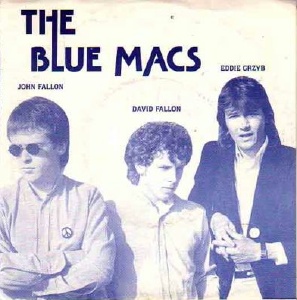
Notes:
Five song EP recorded in LA in late 1982 as a trio with Eddie Gryzb on drums.
Two tracks appear on the Rarities CD.
If you can supply the missing track titles please get in touch.
Acoustic demo recorded in Hollywood in May 1983 as a duo credited to The Steppes Of Russia.
Full track listing unknown, but the following songs were included on the Rarities CD:
I Think I'll Go
No Names Yet For Henry
People People
Kathy Maguire
Third Love Song
Nothing Really Nothing
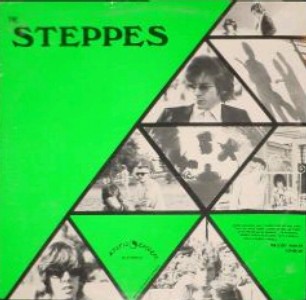
Notes: Recorded in 1983 and 1984 with Tim Gilman (lead guitar) and Dante (drums) who joined in June 1983. A video was made for "Kathy Maguire".
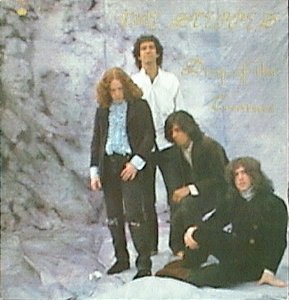
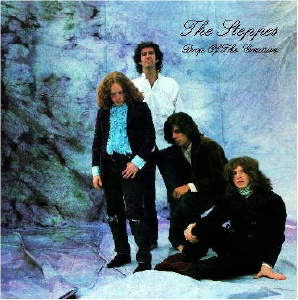
Notes:
Recorded in 1986 at Westbeach Studio, Los Angeles.
Engineered by Brett Gurewitz (Bad Religion!) & John Girdler.
With new drummer Jim Bailey.
Several outtakes from the album sessions later appeared on the Rarities CD:
"Trilogy Of One",
"Mary Mary",
"All You Wanted" (released in 1988 on a free 7" with Italian Magazine Lost Trails) and
"History Hates No Man" (released in 1987 on a free flexi with issue 4 of Freakbeat Magazine)
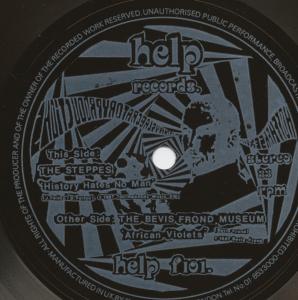
Notes:
Flexi given away with issue 4 of Freakbeat Magazine.
Other side by Bevis Frond ("African Violets"). This track is
included on the Rarities CD.
Notes:
Given away free with issue ??? of the Italian magazine Lost Trails.
Included on the Rarities CD.
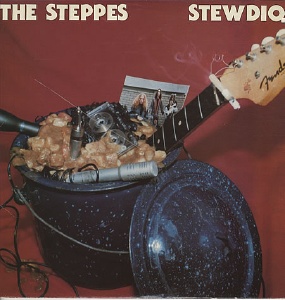
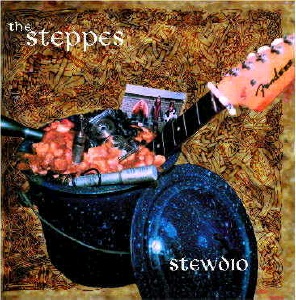
Recorded 1987 at Westbeach Studios, Hollywood, USA. Produced by The Steppes with Brett Gurewitz and engineered by the legendary Starbolt. With new drummer Erik Denning (replaced in 1988 by the returning Jim Bailey). Dreadful pun title and cover, what were they thinking?!
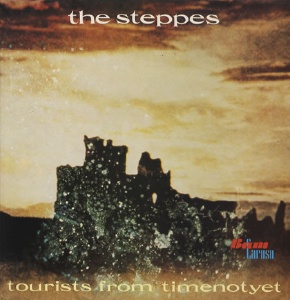
Notes:
Pointless compilation drawn from the first two Voxx albums (7 tracks from "Drop Of The Creature"
and 5 from "Stewdio")
which were still available at the time, albeit as imports to Europe. Perhaps Bam Caruso just wanted a
Steppes release in their catalogue? A poor cover design by Bam Caruso standards too.
Released to coincide with the Euro '88 tour.
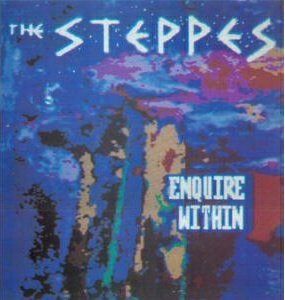
Notes:
Recorded at Goldust Studios in Bromley in late 1988. Released on CD in Germany by the
Music Maniac label with bonus tracks.
The album sessions yielded two outtakes which later surfaced on the Rarities CD:
"Now You Know" and "Man On The Moon". "Master James" was considered for a UK 12" single
release but these plans were scrapped.
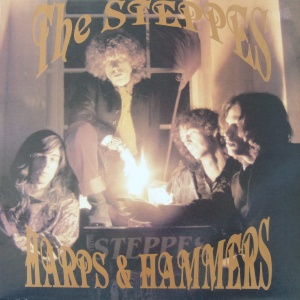
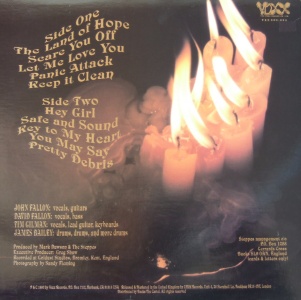
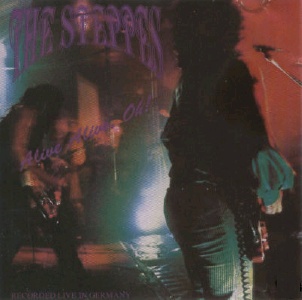
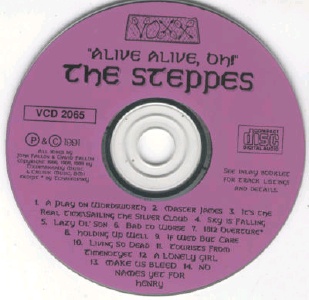
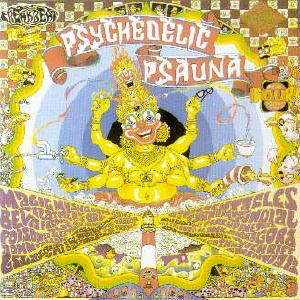
Notes:
Recorded in San Francisco in 1989 by John Fallon.
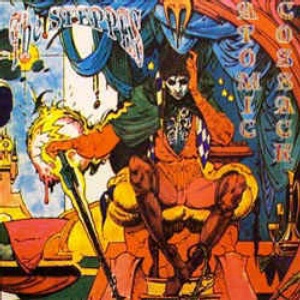
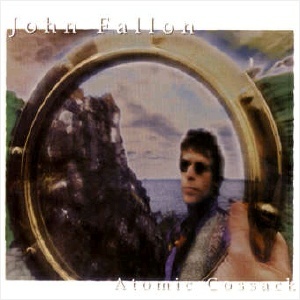
Essentially a John Fallon solo LP. Recorded in September 1991 at Goldust Studios in London with Giles Meredith (of The Grooveyard) on bass and session drummer Alan Tracey. Released somewhat misleadingly as a Steppes album.
Notes:
Released on "Gods, Men and Ghosts" in 1997.
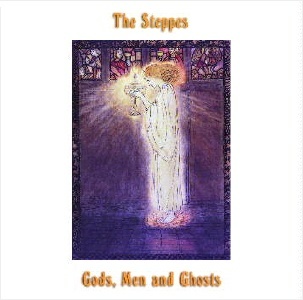
Notes:
Thanks to the efforts of Delerium Records, the band reformed in June 1995
for a one week recording session at Sound Sound Recording in Milwaukee with
John Frankovic of Plasticland
producing.
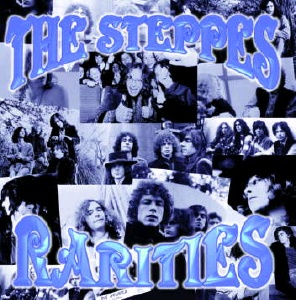
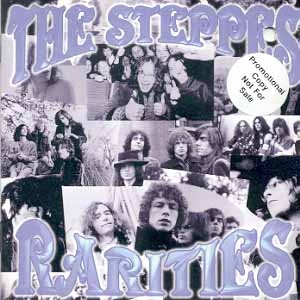
Notes:
70 minutes of unreleased material, demos and rare tracks.
Track 1: recorded at Mystic Studios, Hollywood, June 1985. Overdubs and vocals
on Fostex cassette 4 track at home.
Tracks 2-7: Drop Of The Creature demos, recorded on Fostex cassette 4 track in
John's bedroom in west Covina, California, May-June 1985.
Track 8: Gods, Men and Ghosts alternate mix by John Frankovic in Milwaukee,
Wisconsin, early 1996.
Track 9: John Fallon solo recording, made in 1997 with Roger Connelly (drums).
Track 10: Harps and Hammers demo, mono home cassette recording at David's house,
Tourmakeady, Co. Mayo, Ireland, summer 1989.
Tracks 11-16: Steppes of Russia Acoustic demos, recorded live in studio May 1983, Hollywood,
California. (No Overdubs.)
Tracks 17-19: Enquire Within demos, Tascam Cassette 4 track, june 1988, El
Monte, california.
Tracks 20-21: Blue Macs EP, Recorded June 1982, Sun Valley, California.
We need your help to correct and/or complete this entry. If you can provide more information about this band, have scans, photos or any other memorabilia we can use, or spare copies of any releases, then please get in touch.
